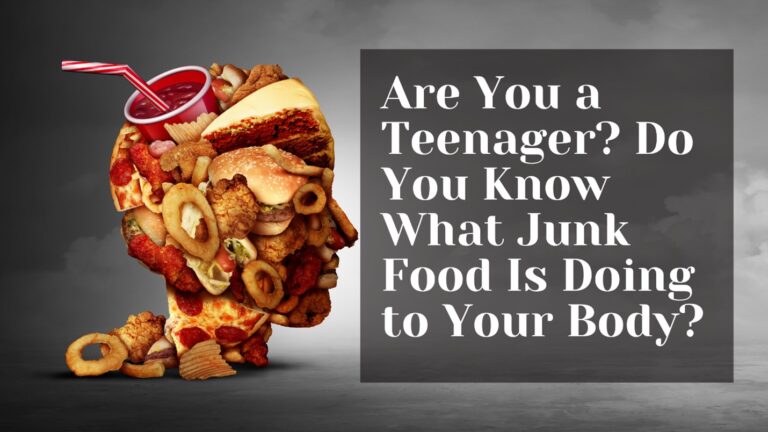Introduction:
Our world is facing an epidemic, as declared by WHO, obesity, which has a significant risk factor or cause of many chronic disorders, including diabetes and heart diseases in adults and teens. The leading cause of teens’ deteriorating health is consuming junk food. The consequences of consuming junk food are a global public health concern because of its surging prevalence. Its consumption has led to obesity. If you are a teen, your day is back-to-back with your classes, sports, and spending time with friends. You are unable to make healthy choices.
What is junk food?
Junk food is a term used to describe the food:
Nutrient deficit but calorie-rich food. Low in good nutrients such as vitamins and fiber but high in unhealthy nutrients including saturated fat and many calories
- High in salt, added sugar, refined carbohydrates, and saturated fats
- Cheap, readily available in markets and stores. Ready to eat from packets.
- Junk food includes several foods, including Snacks such as biscuits, chips, crackers
- Burgers, fried chicken, pizza fries
- Ice cream, cold drinks.
- Packaged meat such as bacon, sugary breakfast cereals, and other meals that are ready to cook, such as lasagne.
These are highly processed foods, meaning they have many salts and preservatives to increase their shelf life so they can be in your cupboard or on the shelves of stores without being spoiled.
The prevalence of obesity in the UK:
Teens are the significant consumers and the main targets of the junk food industry. Advertisements show favorite athletes or heroes promoting and/or eating fried chicken, chips, or soda drinks. Obviously, in real life, there is no way on Earth an athlete eats junk food!
According to two-fifths data released, two-fifths of the teens in England suffer from obesity and are overweight. The National Child Measurement Program statistics, rate teen obesity as 14.4%, and the prevalence of overweight in teens is 27%.
What junk food does to your body:
As you may know that any food consists of three primary nutrients:
- Carbohydrates
- Fats
- Protein
Eating a balanced diet is essential for teens and especially aspiring teen athletes. A balanced or healthy food consists of all nutrients in proportion to promote good health, growth, and proper development. And other micronutrients such as vitamins or minerals.
In contrast, junk food consists of few nutrients, which means it may be high in refined carbs, saturated fats, and added sugar, which is unsuitable for your health.
Let’s do the nutrient breakdown of a beef burger from a fast-food chain.
A burger gives you 40% of your daily caloric needs! The burger consists of a bun, patty, veggies, and sauces. This doesn’t include calories from cold drinks and fries you like to eat with your burger.
|
Nutrients |
Amount |
|
Energy kcal |
600 |
|
Protein |
39.7g |
|
Total fat |
40g |
|
Saturated fat |
19g |
|
Carbohydrates |
45g |
|
Sodium mg |
1150mg |
Table 1 (NUTRIENT breakdown of burger)
Even though fast food consists of high energy in the form of calories, they don’t make you energetic and healthy. Instead, they affect your health; you feel lazy and lethargic. Junk food consists of refined sugar that drops your blood sugar too quickly, making you tired, increasing your appetite, and causing you to crave more junk food.
Junk food effects on your body:
Further more Junk food does not consist of the recommended amount of fibre. Fibre keeps your stomach full, and you don’t feel hungry all the time. It is also suitable for your digestive health. Fast foods do not contain fibre, so you feel hungry after eating your burger or chips.
Being an active teen, you need various nutrients, including essential vitamins and minerals. Unfortunately, junk food lacks these vital nutrients, affecting your performance in the game and your health in the long term. Most elite athletes eat foods rich in vitamins and minerals that help them to grow stronger and excel in their game.
Everything you eat affects your body. Junk food impairs the ability of teens to learn, think, and remember stuff. It also increases the risk of anxiety and depression among teens who love to munch on junk foods all day. Junk food can cause swelling in the memory region of your brain. According to a study among UK teens eating junk food regularly drives memory and focus disruption in teens.
Long-term effects of junk food on teens:
If you daily consume junk foods for a long time, it can cause several harmful effects on the health of teens. Junk foods high in saturated fat can cause high blood cholesterol, leading to heart disorders. Researchers have stated that teens eating foods high in saturated fats are at risk of cardiovascular diseases in the future. Hypertension and stroke are also the consequences of eating junk foods regularly. Hypertension, also known as blood pressure, can affect your brain and cause stroke. Long-term effects of eating junk food can cause tooth decay because these foods are rich in added sugars.
Junk foods are low in fiber, so they can cause constipation, affecting your gut health in the long term.
How to quit junk foods?
It’s hard to quit junk foods because they are everywhere. The junk food industry is bombarding you with attractive advertisements. But here are the tips you can follow to make healthy food choices:
- Start making healthy food choices.
- Eat a balanced diet or rainbow diet. It means eating foods from all food groups as recommended by dietary guidelines. Eat green vegetables, fresh fruits, protein, and grains.
- Take homemade foods in the lunch box to your school or training to avoid junk food
- Keep a water bottle with you so you don’t drink cold drinks or sweetened beverages.
About the author?
Gymate is a not for profit UK initiative to inspire teenagers, young people and anyone new to exercise to start exercising at home. If you have enjoyed this Blog, check out our other Blogs offering health and fitness advice. If your ready to start exercise Gymate workout pages are a good place to start. Looking for stylish active wear / athleisure wear? Our cross ownership company www.gymate-pro.com offers a wide range of Gymate branded active and everyday wear.
References:
- Bohara, S., Thapa, K., Bhatt, L., Dhami, S., & Wagle, S. (2021). Determinants of Junk Food Consumption Among Adolescents in Pokhara Valley, Nepal. Frontiers In Nutrition, 8. doi: 10.3389/fnut.2021.644650
- Datar, A., & Nicosia, N. (2012). Junk Food in Schools and Childhood Obesity. Journal Of Policy Analysis And Management, 31(2), 312-337. doi: 10.1002/pam.21602
- Mayor, S. (2005). Obesity in children in England continues to rise. BMJ, 330(7499), 1044.1. doi: 10.1136/bmj.330.7499.1044
- The Impacts of Junk Food on Health. (2023). Retrieved 6 February 2023, from https://kids.frontiersin.org/articles/10.3389/frym.2022.694523
- Eating processed foods. (2022). Retrieved 6 February 2023, from https://www.nhs.uk/live-well/eat-well/how-to-eat-a-balanced-diet/what-are-processed-foods/
- Making healthier choices | Diabetes My Way | Greater Manchester | Wigan | Tameside NHS. (2023). Retrieved 6 February 2023, from https://diabetesmyway.nhs.uk/keeping-healthy/making-healthier-choices/
- Junk Food Syndrome – Health Action Campaign. (2023). Retrieved 6 February 2023, from https://www.healthactioncampaign.org.uk/selected-blogs/junk-food-syndrome/
- Obesity – Causes. (2017). Retrieved 6 February 2023, from https://www.nhs.uk/conditions/obesity/causes/
- Obesity causes and treatments. (2023). Retrieved 6 February 2023, from https://www.nhsinform.scot/illnesses-and-conditions/nutritional/obesity






